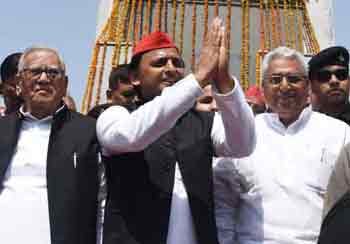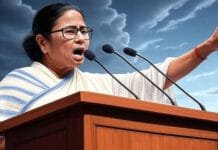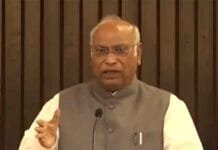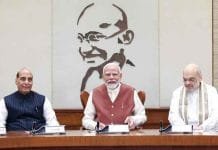
During a public meeting held in Poonch, Jammu and Kashmir, ahead of the Assembly elections in 2024, Congress MP Rahul Gandhi delivered a powerful speech. His message directly accused the BJP-RSS of sowing hatred and violence across the country, particularly in the politically sensitive region of Jammu and Kashmir. Gandhi’s address was not only an appeal to the local populace but also a sharp critique of the ruling government at the center, led by Prime Minister Narendra Modi.
The Allegations Against BJP-RSS: Spreading Hatred and Division
Gandhi minced no words as he took aim at the BJP-RSS ideology. He emphasized that their politics thrives on division, where hatred is used as a tool to gain and maintain power. “The BJP and RSS only know how to spread hatred,” he said, suggesting that their political strategy focuses on pitting communities against each other, thereby fostering an environment of conflict. This accusation reflects the broader opposition narrative that BJP-RSS thrives on polarization, especially along religious and regional lines.
Jammu and Kashmir, a region known for its delicate political fabric, has often been at the center of BJP’s political agenda. The scrapping of Article 370 in 2019, which stripped the region of its special status, has remained a contentious issue. According to Rahul Gandhi, the BJP’s actions in Kashmir exemplify their desire to rule through division rather than fostering unity.
Rahul Gandhi’s Call for Peace: Hatred Cannot Overcome Hatred
One of the key messages in Gandhi’s speech was his call for love and unity as the antidote to the hatred spread by BJP-RSS. “Hatred cannot be cut by hatred,” he said, underscoring the necessity of a more compassionate approach to the country’s political problems. His plea for peace was directed at both the local population of Jammu and Kashmir and the rest of India, where communal tensions have been on the rise under BJP rule.
This call for love over hatred resonates with Congress’ long-standing secular ethos. Gandhi has repeatedly tried to contrast his party’s philosophy of inclusivity and social harmony with what he sees as the BJP’s strategy of divisiveness. His remarks were aimed at invoking a sense of solidarity among people who may feel disenfranchised under the current political climate.
Attacking the Modi Government: Policy U-Turns and Faltering Leadership
In his critique of the Modi government, Rahul Gandhi argued that the administration’s policies are reactive rather than proactive. He claimed that whenever the opposition confronts the government, it is forced to backtrack. Gandhi pointed out that the government has repeatedly taken U-turns on several of its policies when faced with pressure from the public or the opposition.
According to Gandhi, this shows a loss of confidence in Modi’s leadership. He declared that Prime Minister Narendra Modi is no longer the decisive leader he once was. “Narendra Modi’s mental thinking has been broken,” Gandhi said, indicating that the Prime Minister’s ability to govern effectively has diminished. The Congress leader hinted that the BJP’s wavering policies reflect an underlying insecurity within the ruling party, possibly stemming from their increasing unpopularity in several regions.
Restoring Statehood to Jammu and Kashmir: A Demand for Democratic Rights
One of the most crucial parts of Gandhi’s speech was his demand for the restoration of statehood to Jammu and Kashmir. “Your democratic rights have been taken away from you,” he said, referring to the revocation of the state’s special status and its bifurcation into two Union Territories—Jammu and Kashmir and Ladakh. This, according to Gandhi, was a significant assault on democracy.
For the first time in Indian history, a state was downgraded to a Union Territory (UT). This move, executed through the abrogation of Article 370, was met with widespread opposition not just in the region but across the political spectrum. Gandhi emphasized that this decision was not only undemocratic but also a betrayal of the people’s trust. His message resonated with many in the region who feel that their voices have been silenced under the new political arrangement.
The demand for the restoration of statehood is one of the core political issues in Jammu and Kashmir. By raising this issue prominently, Gandhi positioned himself as a champion of the people’s democratic rights, contrasting his vision with that of the BJP-led government, which he accused of undermining democratic principles.
The Broader Political Implications: BJP’s Polarizing Tactics
Rahul Gandhi’s speech also highlighted the broader national implications of the BJP-RSS’s strategies. According to Gandhi, the politics of hatred is not limited to Jammu and Kashmir but extends to other parts of the country. States like Uttar Pradesh, Madhya Pradesh, and Gujarat have also seen instances where communal tensions have flared up under BJP’s rule. Gandhi’s message was clear: the BJP-RSS’s model of governance is designed to polarize communities and keep the country divided.
This polarization, Gandhi argued, is detrimental to India’s long-term unity and stability. The Congress party, on the other hand, positions itself as the party of unity and reconciliation, hoping to bridge the divides that have widened under the BJP’s rule.
Congress’ Vision for Jammu and Kashmir: A Return to Normalcy
In contrast to the BJP-RSS narrative, the Congress party has long advocated for a peaceful resolution to the issues in Jammu and Kashmir. Gandhi emphasized that the region’s troubles could not be solved through military might or authoritarian policies, but through dialogue, development, and the restoration of democratic processes.
The Congress party envisions a return to normalcy in the region, where economic growth, educational opportunities, and social harmony replace the current atmosphere of suspicion and fear. By restoring statehood, Rahul Gandhi believes that the people of Jammu and Kashmir can regain their lost dignity and political voice, which has been stifled under the BJP’s rule.
Conclusion: A Battle for India’s Soul
Rahul Gandhi’s speech in Poonch was not just a critique of BJP-RSS but also a broader appeal to the people of India. He painted a picture of two contrasting visions: one driven by hatred and division, and the other by love and unity. For Gandhi, the upcoming elections are not just about political power but about the very soul of India.
As the battle for Jammu and Kashmir’s statehood and India’s democratic principles continues, Rahul Gandhi has made it clear that he and his party will stand on the side of peace, inclusion, and democratic integrity. His message resonates with those who feel that India’s democracy is under threat, and the stakes in the upcoming elections have never been higher.















